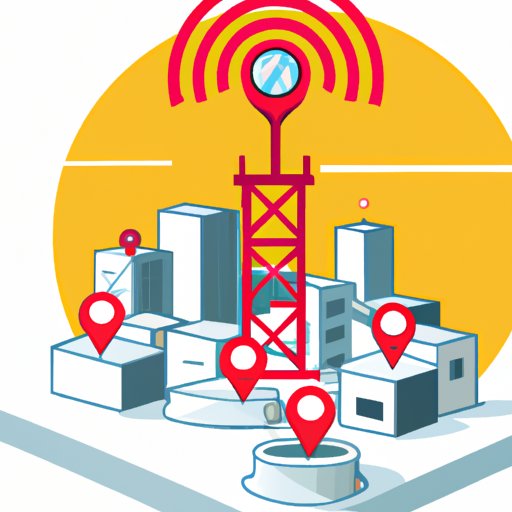Introduction
As smartphones become an integral part of our daily lives, many people have concerns about whether or not it is possible for someone to track their phone’s location, even when location services are turned off. In this article, we take a closer look at the different ways someone can track a phone without location services and provide practical advice and tips that users can implement to protect their privacy.

How Tracking Works Even When Location is Turned Off
Many users believe that turning off location services will prevent anyone from tracking their phone, but that is not always the case. Even with location services turned off, there are various ways someone can track a device’s location.
Cell tower triangulation is one method that can be used to track a device’s location. This is accomplished by determining the signal strength between the device and different cell towers. By comparing the signal strengths, the device’s location can be determined.
Another way tracking can occur is through Wi-Fi tracking. When Wi-Fi is turned on, the device sends out a signal to nearby routers. This signal can be used to determine the device’s location within a specific range.
Bluetooth tracking works similarly to Wi-Fi tracking. When a Bluetooth signal is sent out from a device, nearby devices can detect it. With Bluetooth tracking, the device’s location can be pinpointed much more accurately than with cellular triangulation or Wi-Fi tracking.
Debunking Common Myths About Location Tracking
One of the most common misconceptions about location tracking is that disabling location services will prevent anyone from tracking your phone. However, this is not always true. As mentioned earlier, even when location services are turned off, cell tower triangulation, Wi-Fi tracking, and Bluetooth tracking can be used to track the device’s location.
Another myth about location tracking is that only the government and law enforcement agencies have access to this information. Unfortunately, anyone with the right tools and knowledge can track a device’s location, including hackers and cybercriminals.

Different Methods Used to Track a Device Without Location Services
While cell tower triangulation, Wi-Fi tracking, and Bluetooth tracking are the most common ways to track a device without location services, they are not the only methods. For instance, certain apps can access a device’s microphone and use ambient noise to triangulate its location.
Also, many devices have sensors that can be used to track the device’s movement or orientation. For example, the accelerometer in a smartphone can detect whether the device is moving or stationary. This information can be used to track the device’s location.

Privacy Concerns Surrounding Phone Tracking
The potential risks and consequences of someone tracking your phone are numerous. For one, the data collected from tracking can be used to monitor your daily activities and routines. This information can be sold to marketers for targeted advertising purposes.
In the wrong hands, data collected from phone tracking can also be used for identity theft, stalking, and blackmail. Additionally, tracking can be used as a form of domestic abuse, with abusers using technology to monitor the movements of their victims.
Tips to Prevent Phone Tracking Even With Location Services Turned Off
One practical strategy that users can implement to protect their privacy is to regularly review their phone’s settings and third-party app permissions. This will help ensure that no apps or features are using location services without the user’s knowledge.
Additionally, users can enable two-factor authentication on all their accounts to prevent hackers from accessing their information. Users should also be aware of the security risks associated with using public Wi-Fi, and avoid connecting to unknown networks whenever possible.
Legality of Tracking Someone’s Phone Without Their Consent
The legality and ethics of tracking someone’s phone without their consent is a topic of hot debate. While both private individuals and businesses have the right to protect their property, using tracking technology without the device owner’s consent is generally considered illegal and unethical.
In many cases, the consequences for tracking someone’s phone without their consent can be severe, including fines, imprisonment, and other legal penalties. Businesses that engage in this behavior can also face civil lawsuits and reputational damage.
Implications of Tracking Technology Advancements on Privacy
The rapid advancement of tracking technology has significant implications for privacy. Emerging technologies like facial recognition and AI may blur the lines even further between privacy and surveillance. As devices become more interconnected, it is essential to remain aware of the potential risks involved with sharing personal data and using tracking technologies.
Conclusion
While many users believe that turning off location services will prevent anyone from tracking their phone, there are various ways that someone can collect location data without the user’s knowledge. By understanding how tracking technologies work and implementing best practices for privacy and security, users can protect themselves from potential threats.
Ultimately, privacy is a fundamental right that should not be compromised by the latest technology. By educating ourselves and taking proactive steps to protect our data, we can ensure that we maintain control over our personal information and digital identities.


